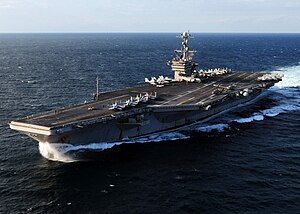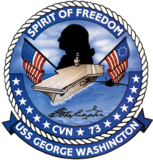
Back يو إس إس جورج واشنطن (CVN - 73) Arabic USS George Washington (CVN-73) Czech USS George Washington (CVN-73) German USS George Washington (CVN-73) Spanish George Washington (laev) Estonian یواساس جورج واشینگتن (سیویان-۷۳) Persian USS George Washington (CVN-73) Finnish USS George Washington (CVN-73) French ג'ורג' וושינגטון (CVN-73) HE USS George Washington (CVN 73) Hungarian
 USS George Washington transiting the East China Sea, December 2010
| |
| History | |
|---|---|
| Name | George Washington |
| Namesake | George Washington |
| Ordered | 27 December 1982 |
| Builder | Northrop Grumman Shipbuilding Newport News |
| Laid down | 25 August 1986 |
| Launched | 21 July 1990 |
| Sponsored by | Barbara Bush |
| Christened | 21 July 1990 |
| Acquired | 8 June 1992 |
| Commissioned | 4 July 1992 |
| Homeport | Yokosuka |
| Identification |
|
| Motto | Spirit of Freedom |
| Nickname(s) | GW |
| Status | in active service |
| Badge |  |
| General characteristics | |
| Class and type | Nimitz-class aircraft carrier |
| Displacement | 104,200 long tons (116,700 short tons)[1][2] |
| Length |
|
| Beam |
|
| Draft |
|
| Propulsion |
|
| Speed | 30+ knots (56+ km/h; 35+ mph)[5] |
| Range | Unlimited distance; 20–25 years |
| Complement |
|
| Crew | 6012 |
| Sensors and processing systems |
|
| Electronic warfare & decoys |
|
| Armament |
|
| Armor | Unknown |
| Aircraft carried | 90 fixed wing and helicopters |
USS George Washington (CVN-73) is a United States Navy nuclear-powered aircraft carrier, the sixth carrier in the Nimitz class and the fourth US Navy ship with that name, after George Washington, Founding Father, commander-in-chief of the Continental Army during the American Revolutionary War, and the first president of the United States. The contract for George Washington was awarded to Newport News Shipbuilding on 27 December 1982. Her keel was laid on 25 August 1986, she was christened on 21 July 1990 by First Lady Barbara Bush, and the vessel was commissioned at Naval Station Norfolk on 4 July 1992.
In 2008, USS George Washington became the first nuclear powered aircraft carrier to be forward-deployed at naval base Yokosuka, Japan.
The carrier underwent her four-year Refueling and Complex Overhaul (RCOH) beginning in August 2017. After refueling was completed additional repairs were found to be needed and the overhaul was extended. The ship was returned to service in May 2023.
- ^ Polmar, Norman (2004). The Naval Institute guide to the ships and aircraft of the U.S. fleet. Naval Institute Press. p. 112. ISBN 978-1-59114-685-8. Archived from the original on 24 March 2017.
- ^ "CVN-68: NIMITZ CLASS" (PDF). Archived (PDF) from the original on 1 May 2017. Retrieved 21 October 2020.
- ^ Kuperman, Alan; von Hippel, Frank (10 April 2020). "US Study of Reactor and Fuel Types to Enable Naval Reactors to Shift from HEU Fuel". International Panel on Fissile Materials. Archived from the original on 5 October 2021. Retrieved 26 February 2022.
- ^ Hanlon, Brendan Patrick (19 May 2015). Validation of the Use of Low Enriched Uranium as a Replacement for Highly Enriched Uranium in US Submarine Reactors (PDF) (MSc). Massachusetts Institute of Technology. Archived (PDF) from the original on 9 October 2021. Retrieved 26 February 2022.
- ^ Gibbons, Tony (2001). The Encyclopedia of Ships. London, United Kingdom: Amber Books. p. 444. ISBN 978-1-905704-43-9.